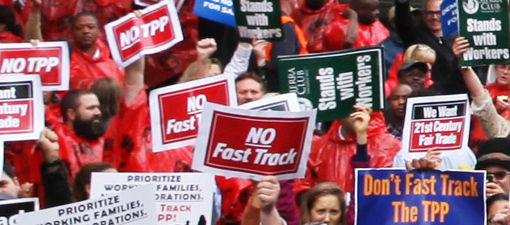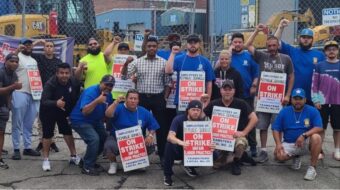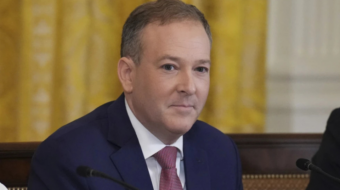
WASHINGTON (PAI) – Dealing a setback to President Obama and congressional Republicans, the Senate voted on May 12 to sidetrack fast-track presidential trade promotion authority, at least for now.
Union leaders hailed the Senate vote, which forces senators to postpone the debate on fast-track until after the Memorial Day recess and gives its foes, led by workers, environmentalists, church and community groups, more time to lobby lawmakers.
“It’s like David and Goliath. We’re David and we have a slingshot,” Communications Workers President Larry Cohen told Press Associates Union News Service in a walk-and-talk after a rally to unveil a progressive agenda. “We get at least two more weeks to mobilize.”
Unions and their allies have rounded up a heavy majority of congressional Democrats, in both the House and the Senate, against fast-track. Unionists note that all prior trade pacts are job losers. “The TPP threatens jobs,” said Rep. Rosa DeLauro, D-Conn., its leading House foe.
“I challenge any member of Congress to show us a trade deal that gave us a net increase in jobs and a net increase in wages,” Steelworkers President Leo Gerard declared at the progressive agenda rally. “They can’t find it.”
And they note fast-track would let Obama, and his successor, jam through the Trans-Pacific Partnership (TPP), the worst of three trade pacts Obama wants to implement before he leaves office. Another is with Europe, while the third opens trade in services – including government services – to foreign firms.
The TPP pact is considered the worst because, like the others, it doesn’t write worker rights into its text, and because it includes nations with extremely low wages and massive worker repression. Multinationals could then export U.S. jobs to those countries.
“We shouldn’t engage in trade agreements that put our manufacturing workers in direct competition with workers earning 60 cents an hour,” Sen. Jeff Merkley, D-Ore., told the progressive agenda rally. The agenda includes opposition to fast track.
The TPP also includes a secret trade court, the Investor State Dispute System, to let corporations challenge federal, state and local laws that might harm present or future profits. The ISDS would threaten everything from Buy American laws to job safety and health laws.
“The fast-track bill is halted – for now,” AFL-CIO President Richard Trumka said in a statement. “That’s good news for America’s working families, domestic producers, and communities. We appreciate those senators who stood with working people today against a bill that would have led to undemocratic trade deals that lower wages and eliminate jobs. This vote sends a message loud and clear.
“If Congress is serious about creating jobs, reviving U.S. manufacturing, and raising wages, it needs to use its leverage to reshape the terms of the Trans-Pacific Partnership. It must remove special legal privileges for foreign investors, add enforceable rules to prevent currency manipulation, strengthen rules of origin, and redouble efforts to ensure workers everywhere can organize and bargain collectively.”
Labor mobilized its members to sidetrack fast-track in the Senate and to continue its lobbying in the House, where the vote is, so far, too close to call. The Steelworkers activated their Rapid Response network for weeks, and Cohen predicted that if CWA had 10,000 activists working against fast-track before the Senate balloting, it’ll have 20,000 now.
“Working families are tired of Washington politicians telling them what’s economically best. We are all living today’s reality of trade policies that have accelerated offshoring and outsourcing of good jobs. Working Americans don’t want their elected leaders using a rubber stamp for a trade deal that is hidden behind a veil of secrecy,” Gerard said in a statement, separate from his speech at the rally.
Before the vote, Trumka had made it clear that labor isn’t reflexively opposed to trade – but that it is opposed to trade pacts that hurt workers.
In an op-ed piece in the Washington Post, entitled “Let’s see a TPP that respects workers’ rights,” he said unions and workers had, for five years, submitted and lobbied for pro-worker changes to the TPP. The Obama Administration never replied, or even acknowledged the proposals, he added.
“The AFL-CIO, working with union federations from the other TPP countries” sought to improve the pact’s labor chapter “and address the failures of prior trade deals,” he explained.
Its proposals included the right to submit “a single egregious violation” of worker rights – such as a mass firing or killings – to the trade courts, “clear rules and deadlines for action on meritorious cases,” a ban on child labor, protection for migrant workers and new standards for labor inspections and decent work. All would be enforced by “an independent secretariat.”
The administration’s response has been silence. “We don’t know whether any of our proposals made it into the TPP, since the text has not been made public. The administration has given no indications that our suggestions have been incorporated into its own negotiation text” much less the TPP itself, he said.
Under those circumstances, he said, workers cannot support the TPP – or fast-track that would permit it.










